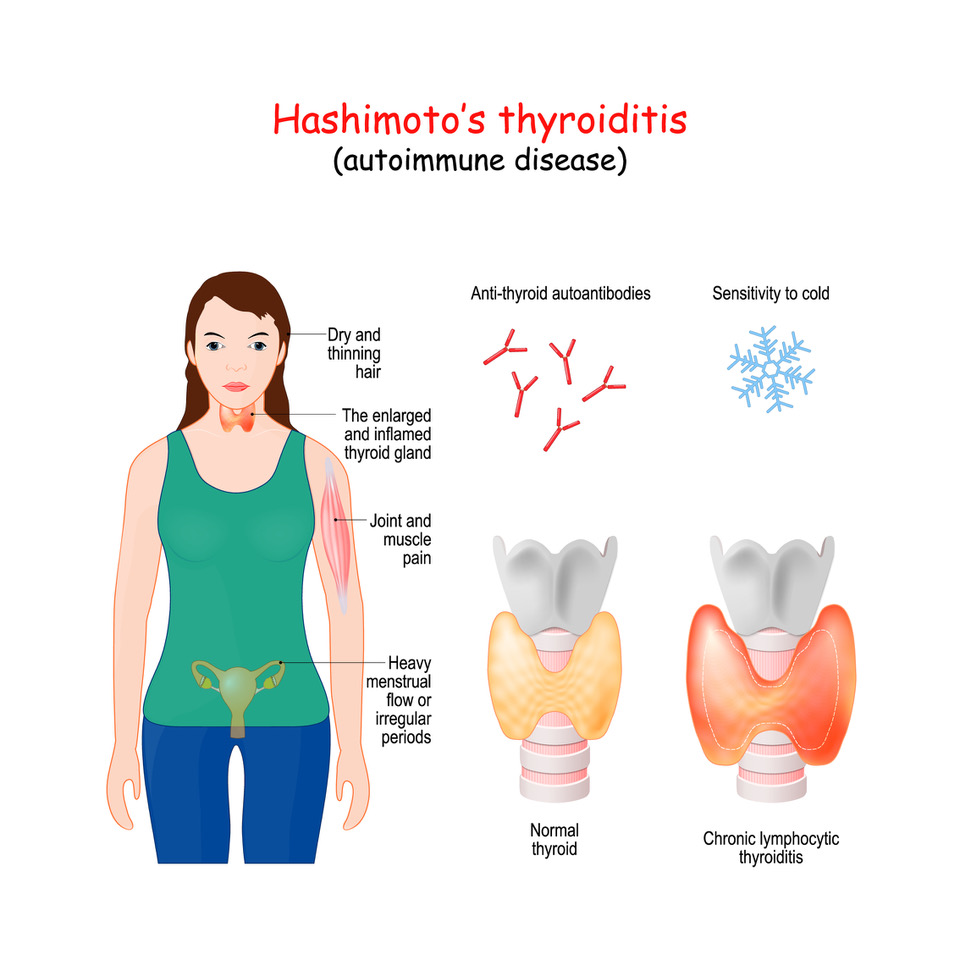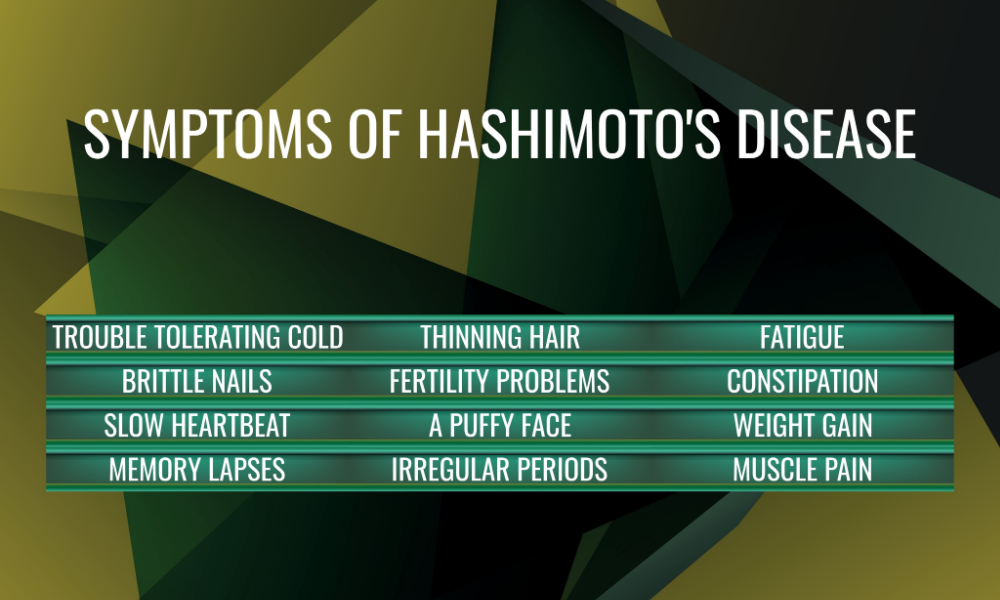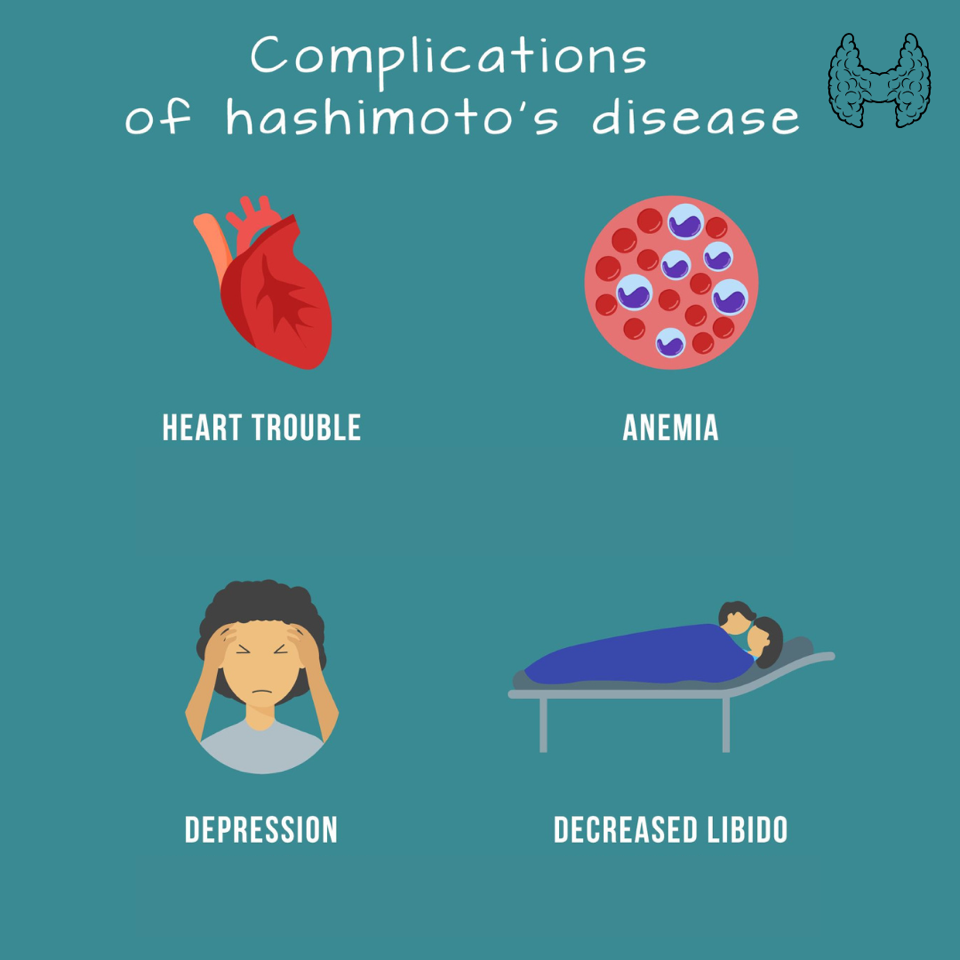What's On This Page?
ToggleThe thyroid hormone is not always understood, so I’ll tell you that it is a fat-burning switch. If the hormone swings low, you gain weight, if it’s elevated you may not be able to gain weight. With the auto-immune condition Hashimoto’s, your levels of thyroid hormone may be like a pendulum driving you crazy with varying symptoms.
I think many people have this condition and do not know it yet. Today’s article is to help you understand the symptoms, as well as new information about them.
Hashimoto’s may brain fog, body pain, hair loss, sensations of cold hands/feet, muscle pain, dry skin, and more! Definitely makes a person feel uncomfortable in their own skin. You can see in the graphic below just how many body systems are impacted.
Hashimoto’s is usually hallmarked by LOW levels of thyroid hormone, however that is not really accurate, it can be normal, and it can swing high and it can be low. Ultimately, after the attack has wreaked havoc on the body, it will be low after all is said and done. That’s why many people with Hashi are supported on thyroid medications, it’s to support and replenish the hormone that your body used to make.
Some people don’t realize that Hashimoto’s or “Hashi’s” for short is an autoimmune condition!
So is Graves’ disease which is hallmarked by elevated thyroid hormone in the body. That means that the problem doesn’t stem from your thyroid gland, it stems from your immune system.
Many people have both Hashimoto’s and Graves’ because their hormones swing high and low. If you have either of those conditions or both of them, you have autoimmunity and need to address more than your thyroid gland in order to get well. Medications won’t be enough, although they are useful in restoring lost thyroid hormone.
With all autoimmune conditions, the gland or tissue being attacked is being attacked by your own immune system. Sometimes that occurs due to a prior infection you’ve had, from a dietary antigen, or some other toxin that you’ve been exposed to.
Either way, Hashimoto’s symptoms can go on for years without a proper diagnosis.
It’s kind of like long haulers in the sense that you have lingering symptoms from something a while ago, and then it turned autoimmune. Many infections go autoimmune, in fact, I’d venture to say MOST!
Hashimoto’s disease is an immune disorder and condition in which your own immune system attacks your thyroid.

When the human body’s own immune system targets the thyroid gland as if it were a foreign tissue, it causes an autoimmune disorder of the thyroid gland termed Hashimoto’s thyroiditis; other names for this condition include chronic lymphocytic thyroiditis or chronic thyroiditis.
A new study published in June 2021, in the Romanian Journal of Internal Medicine found that the ratio of uric acid to HDL cholesterol is elevated.
Both uric acid and HDLF can be measured with simple blood tests and they abbreviate the ratio as UHR in case you look this up. In other words, people with Hashimoto’s (and probably other inflammatory conditions) tend to have a higher level of uric acid/HDL when compared to people who are not ill.
This is a useful and reliable biomarker when it comes to ascertaining whether or not you (or your patient) have Hashimoto’s. Of course, other labs would be included such as TPO and TG levels, and more! This finding is brand new and based on the research of Dr. Ozge Kurtkulagi and his team.
Hashi’s like other autoimmune conditions will cause pro-inflammatory cytokines that attack different systems of the body. So antioxidants are very important, and a clean diet is too. With immune-driven thyroid conditions, there is always an infiltration of “lymphoid” cells, and atrophy of the tissue will eventually destroy the thyroid gland.

Over time, the chronic assault from your immune system and the resulting degradation of the thyroid gland causes inflammation of the glandular tissue and suppressed thyroid hormone production.
In fact, Hashimoto’s disease is the most common precipitating root cause of hypothyroidism in the United States. It may take years to be “hypo” though because your immune system takes a long time to destroy the thyroid gland, that doesn’t happen overnight.
You can use this time wisely to intercept the assault, change your lifestyle and diet, and try immuno-supportive meds and supplements. If you are interested in a general book about hypothyroidism, refer to my book Thyroid Healthy, which is sold on AMAZON.
Digestive enzymes are important for a person with any type of autoimmune condition because they help reduce the burden of partially digested proteins in your body, which sometimes exacerbates your symptoms. When a dietary antigen is seen by your immune system – and I’m thinking gluten or casein – your immune system goes to work to fight that off, not realizing it is attacking its own tissue.
So your intestinal microflora plays a role, and probiotics are useful, especially in Graves’ disease (see this STUDY from May 2021) but I wonder if digestive enzymes are even more important. It’s fair to say that intestinal microflora 100% influences the way a person with autoimmunity feels, however, it is the digestive enzymes that help to relieve the body of a percentage of dietary antigens.

It’s terrible how long a person has to suffer (in some cases) before they’re properly diagnosed. A new meta-analysis into thyroid conditions has just been published. The RESEARCH was led by two physicians, Paul van Trotsenburg, MD, Ph.D. and Christiaan Mooij MD, Ph.D., and they concur with other experts that a person may have perfect thyroid hormone levels, but yet still suffer from persistent symptoms.
Furthermore, they find there’s a significant relationship between persisting symptoms and thyroid autoimmunity, even if a person is medicated. Symptoms can go on, and be challenging before some people even go to the doctor!
Other symptoms of thyroid dysfunction include problems with memory. Is it crisp and do you focus on what people are saying? Do you have more anxiety lately or suffer from insomnia? Brain problems are an underdiagnosed, but well-known phenomenon that occurs with this condition, and it’s called Hashimoto’s Encephalopathy.
And finally, low thyroid hormone is a common cause of diabetes. Most people with diabetes don’t know that, but it’s true, that undiagnosed hypothyroidism will lead to diabetes. It’s covered in my book. You can CLICK HERE to read reviews or buy a copy of my book entitled Diabetes Without Drugs.
Sometimes thyroid problems can be mitigated with antioxidants (especially those that specifically break down peroxide and turn it into water and oxygen). Also, certain minerals are known to help reduce TPO antibodies in the body, one goal of treatment. In the meantime, some of the things you can do to help yourself with Hashimoto’s include the following:
1. Reduce peroxide and break it down with the catalase enzyme
2. Calm down the inflamed tissues by eating a low-histamine diet
3. Consider minerals like selenium to support healthy TPO levels
4. Take protease enzymes and/or DPPIV to help break down gluten and casein
5. Routinely check blood levels for thyroid antibodies, uric acid, HDL, free T3/T4, and more
6. Consider probiotics and a high-quality B complex vitamin
Certain foods can trigger you, especially those that are high in histamine. I wrote a special Food Guide that I’m giving away called “Hashi No No’s” and it’s downloadable at my website HERE.

Suzy Cohen, has been a licensed pharmacist for over 30 years and believes the best approach to chronic illness is a combination of natural medicine and conventional. She founded her own dietary supplement company specializing in custom-formulas, some of which have patents. With a special focus on functional medicine, thyroid health and drug nutrient depletion, Suzy is the author of several related books including Thyroid Healthy, Drug Muggers, Diabetes Without Drugs, and a nationally syndicated column.



